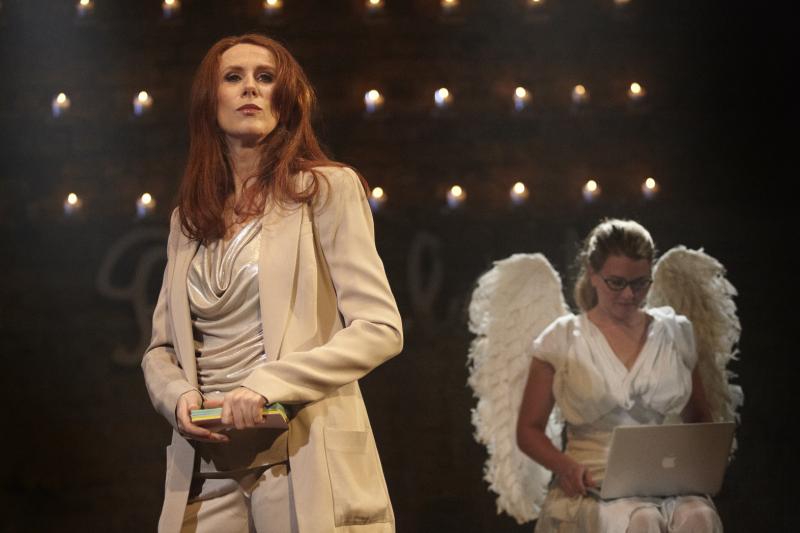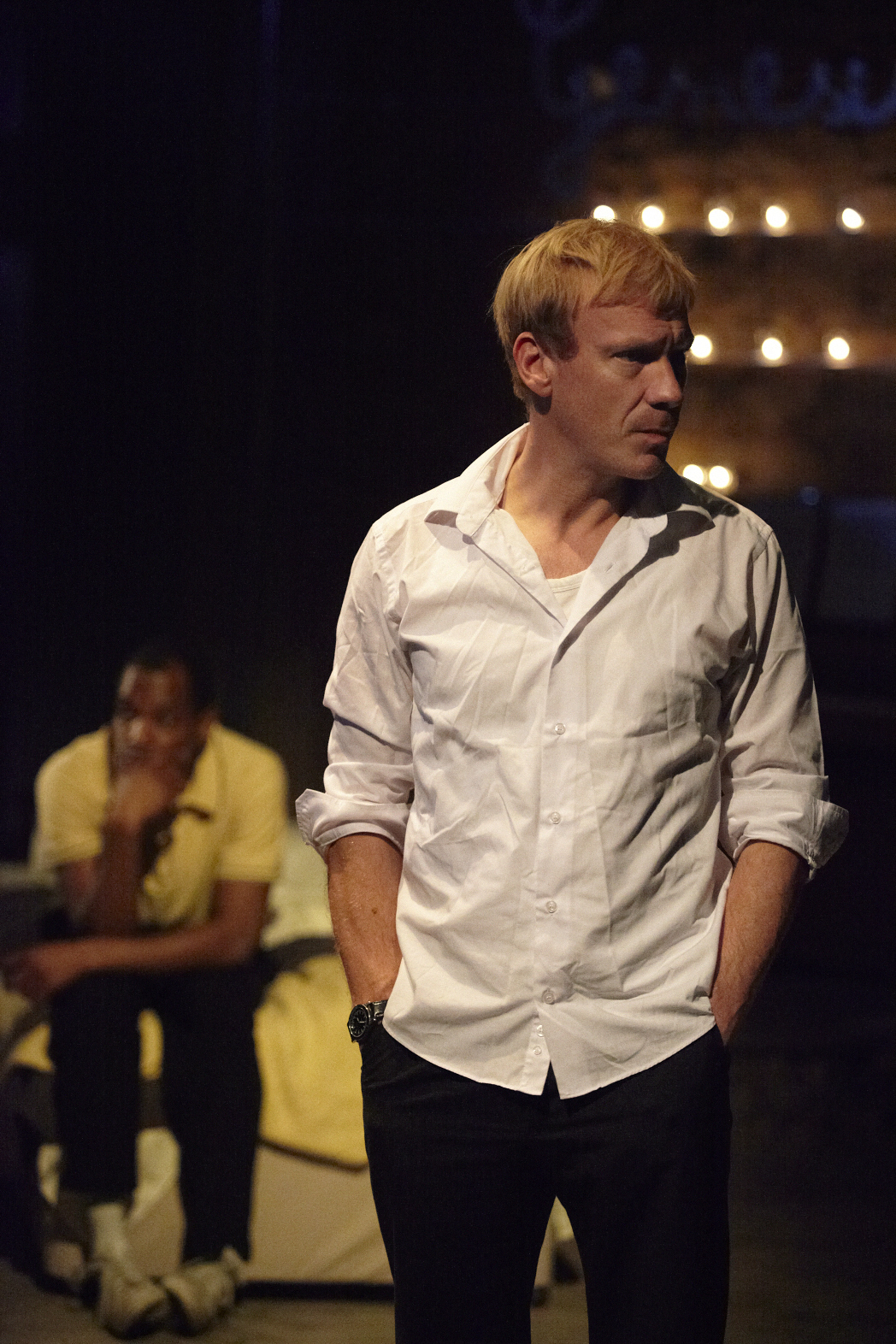Sixty-Six Books, Bush Theatre | reviews, news & interviews
Sixty-Six Books, Bush Theatre
Sixty-Six Books, Bush Theatre
Sixty-six writers, 23 directors and 130 actors launch the new Bush Theatre

Sometimes theatre people do mad things. Like stay up all night and the following day to “celebrate” the King James Bible and a theatre’s house-move to new premises. Its 400th year has been a good year for that collection of stories currently being advertised elsewhere as “the book that changed the world”.
The Bush went for broke for its relaunch opening night - nothing less than a 24-hour theatrical binge, starting at 7pm on Friday night and going through non-stop till Saturday evening at 7pm with 66 new plays "responding" to all 66 books of the King James Bible. Sixty-six writers, 23 directors and 130 actors are the awesome statistics.
I have to fess up to only joining the gallant band in the late morning. By that time, they had been through the night with the Old Testament, starting with Jeanette Winterson’s Godblog with Catherine Tate, were well on their way through the New Testament and were lining up for the final stages. I had missed the gospel band brought in around 4am to rally flagging spirits and the Archbishop of Canterbury, Rowan Williams, tussling with Lazarus. I joined at Paul’s Epistle to the Ephesians, decanted by none other than the writing comedy duo of Marks (Laurence) and Gran (Maurice), late of Birds of a Feather, Rik Mayall’s The New Statesman and many more TV hits. It was a gentle introduction. The title, Ephesus-Schmephesus, tells you all you need to know. A deliciously comic take on St Paul envisaged as a slightly camp Damascean convert, trying to explain his Christian conversion to his very Jewish mother and local rabbi.
With such a welter of writers and styles, these modern equivalents sometimes baffled, sometimes moved me and one or two simply didn’t work
No time here to run through the highs and lows and the specific spills and thrills of the other 17 plays that passed before me in the following seven hours. With such a welter of writers and styles in short 15-minute-or-less slices, plus my own barely glancing acquaintance with the later stages of the Bible (Thessalonians or Philemon anyone?), some baffled me, some stood on their own as pungent emotional or psychological snapshots, and some didn’t quite work. All were brilliantly performed.
Re-reading in the early hours the original Epistle of Paul to the Philippians on which Chris Goode had based his response, The Loss of All Things, I am still puzzled as to the link between the two, other than the line, "I count all things but loss for the excellency of the knowledge of Christ Jesus my Lord; for whom I have suffered the loss of all things." Nonetheless Goode’s piece, involving a teacher keeping a couple of gay schoolboys in detention, haunts me still, troubling through the Philip Ridley-like darkness of its imagery and the intensity of its subversions.
 Anthony Weigh’s The Middle Man (Hebrews) was another gay-themed play that showed how much today’s writers are drawn to taking on the issue, homosexuality, over which Christians (and other religions) continue to tie themselves in knots. Weigh’s play parallels Hebrews, chapter for chapter, but transfers it to a gay pick-up between a married man, Timothy (Shaun Dingwall, pictured right), contemplating suicide because his wife has discovered his bisexuality, and a young black cook, Paul (Syrus Lowe, pictured behind Dingwall), working in a monastery. Undeniably ambivalent in tone, still there’s no missing Weigh’s celebratory, guilt-free approach.
Anthony Weigh’s The Middle Man (Hebrews) was another gay-themed play that showed how much today’s writers are drawn to taking on the issue, homosexuality, over which Christians (and other religions) continue to tie themselves in knots. Weigh’s play parallels Hebrews, chapter for chapter, but transfers it to a gay pick-up between a married man, Timothy (Shaun Dingwall, pictured right), contemplating suicide because his wife has discovered his bisexuality, and a young black cook, Paul (Syrus Lowe, pictured behind Dingwall), working in a monastery. Undeniably ambivalent in tone, still there’s no missing Weigh’s celebratory, guilt-free approach.
I absolutely loved the South African writer Zukiswa Wanner’s Uncool Religion (Colossians), a savage personal upbraiding to the Apostle Paul, delivered by Rakie Ayola with grace and cool anger. Written from an African perspective, Wanner’s weapon is a steely irony and understatement. “Women should submit to their husbands,” goes the scripture. “Really, Paul?” replies Wanner, describing how in Africa when dutiful wives submit they become infected with Aids from their husbands returning to their villages from working in towns and sleeping with other women. Point taken.
Other highlights included Christopher Shinn’s Falling Away (Thessalonians 2), Anya Reiss’s fiery sermon on hypocrisy, Titus Sermon (Titus), in which a modern vicar admonishes his congregation for hounding his colleague, the most saintly, kindly and genuinely Christian of men found downloading questionable pictures at home. And Helen Mort’s poignant, short, sharp homage to a traumatised squaddie returned from Iraq, Snow in Sheffield.
In Falling Away, Mark Bonnar and Indira Varma struggle to define the morality of love. Anna and Tom love each other, but Anna is married to an (unseen) increasingly depressed, out-of-work artist. Can Anna leave him for Tom, who expresses the certainty that he and she could make a good life together? Anna forgoes it because her underlying belief is that life is about “commitments and love and care”. In an age given to instant self-gratification, Shinn gives us a wonderfully subtle example of a biblical teaching that carries recognisable contemporary moral force.
On a different tack, David Edgar’s Concerning Faith (Timothy 1), meanwhile, goes the historical route. Brief, succinct and very telling, he gives us a reminder of the cost of believing in the then heretically regarded New Testament through accounts from three 16th-century English bishops: Latimer, Tunstall, Parker. Being burnt at the stake. That’s where pursuing truth could sometimes lead you. If this extraordinary project has anything to teach us, it is about the changing nature of the interpretation of that truth, and the gap between the reality of goodness and the doctrines laid down by institutionalised religion.

More can so often be too much. But I came away marvelling at Rourke’s chutzpah to launch a new building with all guns blazing and the success of the conversion with its open-to-all friendliness (auditorium, pictured left © Philip Vile). As Rourke remarked, in 24 hours we had seen more writers, directors and actors pass through the stage than we would see in four years. Seeing only one play in a night is going to seem very small beer after this.
- Sixty-Six Books continues at the Bush Theatre, 28 Uxbridge Road, London, until 29 October with 24-hour performances on 14 & 28 October. Westminster Abbey event on 21 October
rating
Buy
Explore topics
Share this article
The future of Arts Journalism
You can stop theartsdesk.com closing!
We urgently need financing to survive. Our fundraising drive has thus far raised £49,000 but we need to reach £100,000 or we will be forced to close. Please contribute here: https://gofund.me/c3f6033d
And if you can forward this information to anyone who might assist, we’d be grateful.

Subscribe to theartsdesk.com
Thank you for continuing to read our work on theartsdesk.com. For unlimited access to every article in its entirety, including our archive of more than 15,000 pieces, we're asking for £5 per month or £40 per year. We feel it's a very good deal, and hope you do too.
To take a subscription now simply click here.
And if you're looking for that extra gift for a friend or family member, why not treat them to a theartsdesk.com gift subscription?
more Theatre
 Othello, Theatre Royal, Haymarket review - a surprising mix of stateliness and ironic humour
David Harewood and Toby Jones at odds
Othello, Theatre Royal, Haymarket review - a surprising mix of stateliness and ironic humour
David Harewood and Toby Jones at odds
 Macbeth, RSC, Stratford review - Glaswegian gangs and ghoulies prove gripping
Sam Heughan's Macbeth cannot quite find a home in a mobster pub
Macbeth, RSC, Stratford review - Glaswegian gangs and ghoulies prove gripping
Sam Heughan's Macbeth cannot quite find a home in a mobster pub
 The Line of Beauty, Almeida Theatre review - the 80s revisited in theatrically ravishing form
Alan Hollinghurst novel is cunningly filleted, very finely acted
The Line of Beauty, Almeida Theatre review - the 80s revisited in theatrically ravishing form
Alan Hollinghurst novel is cunningly filleted, very finely acted
 Wendy & Peter Pan, Barbican Theatre review - mixed bag of panto and comic play, turned up to 11
The RSC adaptation is aimed at children, though all will thrill to its spectacle
Wendy & Peter Pan, Barbican Theatre review - mixed bag of panto and comic play, turned up to 11
The RSC adaptation is aimed at children, though all will thrill to its spectacle
 Hedda, Orange Tree Theatre review - a monument reimagined, perhaps even improved
Scandinavian masterpiece transplanted into a London reeling from the ravages of war
Hedda, Orange Tree Theatre review - a monument reimagined, perhaps even improved
Scandinavian masterpiece transplanted into a London reeling from the ravages of war
 The Assembled Parties, Hampstead review - a rarity, a well-made play delivered straight
Witty but poignant tribute to the strength of family ties as all around disintegrates
The Assembled Parties, Hampstead review - a rarity, a well-made play delivered straight
Witty but poignant tribute to the strength of family ties as all around disintegrates
 Mary Page Marlowe, Old Vic review - a starry portrait of a splintered life
Tracy Letts's Off Broadway play makes a shimmeringly powerful London debut
Mary Page Marlowe, Old Vic review - a starry portrait of a splintered life
Tracy Letts's Off Broadway play makes a shimmeringly powerful London debut
 Little Brother, Soho Theatre review - light, bright but emotionally true
This Verity Bargate Award-winning dramedy is entertaining as well as thought provoking
Little Brother, Soho Theatre review - light, bright but emotionally true
This Verity Bargate Award-winning dramedy is entertaining as well as thought provoking
 The Unbelievers, Royal Court Theatre - grimly compelling, powerfully performed
Nick Payne's new play is amongst his best
The Unbelievers, Royal Court Theatre - grimly compelling, powerfully performed
Nick Payne's new play is amongst his best
 The Maids, Donmar Warehouse review - vibrant cast lost in a spectacular-looking fever dream
Kip Williams revises Genet, with little gained in the update except eye-popping visuals
The Maids, Donmar Warehouse review - vibrant cast lost in a spectacular-looking fever dream
Kip Williams revises Genet, with little gained in the update except eye-popping visuals
 Ragdoll, Jermyn Street Theatre review - compelling and emotionally truthful
Katherine Moar returns with a Patty Hearst-inspired follow up to her debut hit 'Farm Hall'
Ragdoll, Jermyn Street Theatre review - compelling and emotionally truthful
Katherine Moar returns with a Patty Hearst-inspired follow up to her debut hit 'Farm Hall'
 Troilus and Cressida, Globe Theatre review - a 'problem play' with added problems
Raucous and carnivalesque, but also ugly and incomprehensible
Troilus and Cressida, Globe Theatre review - a 'problem play' with added problems
Raucous and carnivalesque, but also ugly and incomprehensible

Add comment